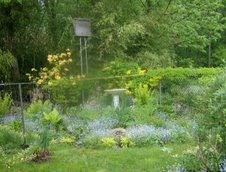Top Ten Methods to Improve Plant Hydration within the Garden
one. Water deeply but no additional deeply than the foundation zone of the plant. Additional than that's unnecessary.
two. Water slowly – flip down the flow. Too heavy of a flow of water can result in run-off and wasted water.
three. Water infrequently however thoroughly. Adjust the droplets to a bigger size to minimize evaporation. Frequent shallow watering causes plants to concentrate their root system shut to the surface resulting in plants that are additional sensitive to water fluctuations.
four. Loosen the soil. Compacted soil leads to water wasted by run-off.
five. Mulch, mulch, mulch! Adequate mulching conserves water by serving to keep the soil loose and reducing evaporation. Coarse mulches need to be applied in an exceedingly thicker layer (3-four inches) for maximum effectiveness whereas finer mulches can be applied one-2 inches deep.
six. Build sure to stay your garden well weeded to scale back competition for precious moisture. Also take into account removing surplus plants for the identical reason. This will provide you plants to share!
seven. In the vegetable garden, use wide rows and plant crops nearer together. This strategy can allow your plants to own masses of needed sun for growth and fruitfulness but still offer further shade by the base to assist reduce evaporation.
eight. Avoid watering throughout windy weather! Wind could be a huge moisture stealer.
nine. Water early in the morning when humidity is the best to scale back evaporation.
ten. Contemplate using soaker hoses and timers rather than sprinklers. This way you'll be able to strategically concentrate the exact correct quantity of precious water at the base of the plants so as to use less water but still achieve smart deep irrigation. Also, think about collecting rainwater using rain barrels (a fancy name for a coated trash will) beneath your downspouts. Simply make positive they are lined to keep curious children and animals from falling in and drowning.
As you'll see, little investments in time and coming up with when watering the garden can reap massive advantages in water conservation. Organic gardening does not need to be difficult. Using our resources sensibly just makes sense.
one. Water deeply but no additional deeply than the foundation zone of the plant. Additional than that's unnecessary.
two. Water slowly – flip down the flow. Too heavy of a flow of water can result in run-off and wasted water.
three. Water infrequently however thoroughly. Adjust the droplets to a bigger size to minimize evaporation. Frequent shallow watering causes plants to concentrate their root system shut to the surface resulting in plants that are additional sensitive to water fluctuations.
four. Loosen the soil. Compacted soil leads to water wasted by run-off.
five. Mulch, mulch, mulch! Adequate mulching conserves water by serving to keep the soil loose and reducing evaporation. Coarse mulches need to be applied in an exceedingly thicker layer (3-four inches) for maximum effectiveness whereas finer mulches can be applied one-2 inches deep.
six. Build sure to stay your garden well weeded to scale back competition for precious moisture. Also take into account removing surplus plants for the identical reason. This will provide you plants to share!
seven. In the vegetable garden, use wide rows and plant crops nearer together. This strategy can allow your plants to own masses of needed sun for growth and fruitfulness but still offer further shade by the base to assist reduce evaporation.
eight. Avoid watering throughout windy weather! Wind could be a huge moisture stealer.
nine. Water early in the morning when humidity is the best to scale back evaporation.
ten. Contemplate using soaker hoses and timers rather than sprinklers. This way you'll be able to strategically concentrate the exact correct quantity of precious water at the base of the plants so as to use less water but still achieve smart deep irrigation. Also, think about collecting rainwater using rain barrels (a fancy name for a coated trash will) beneath your downspouts. Simply make positive they are lined to keep curious children and animals from falling in and drowning.
As you'll see, little investments in time and coming up with when watering the garden can reap massive advantages in water conservation. Organic gardening does not need to be difficult. Using our resources sensibly just makes sense.




No comments:
Post a Comment